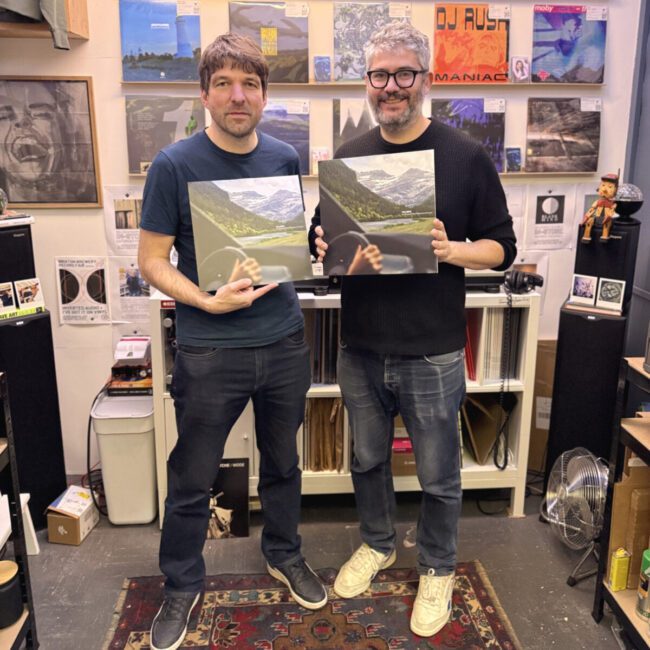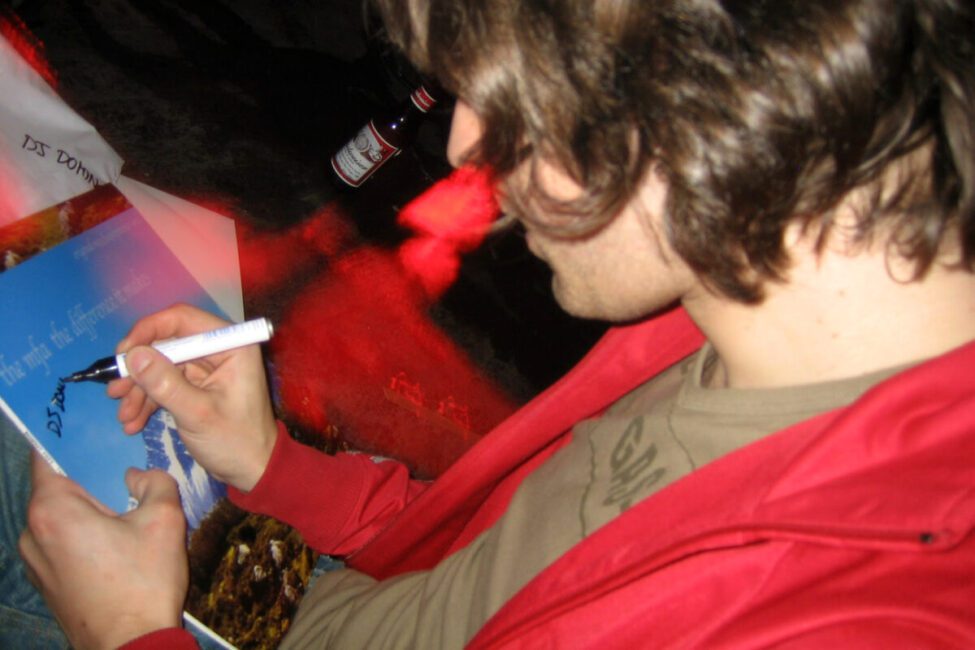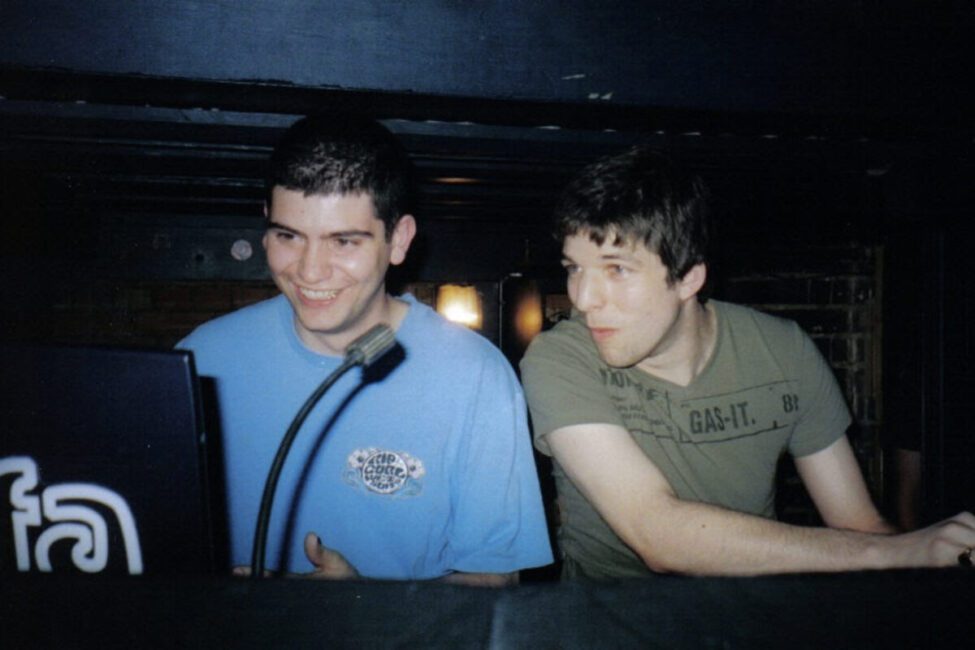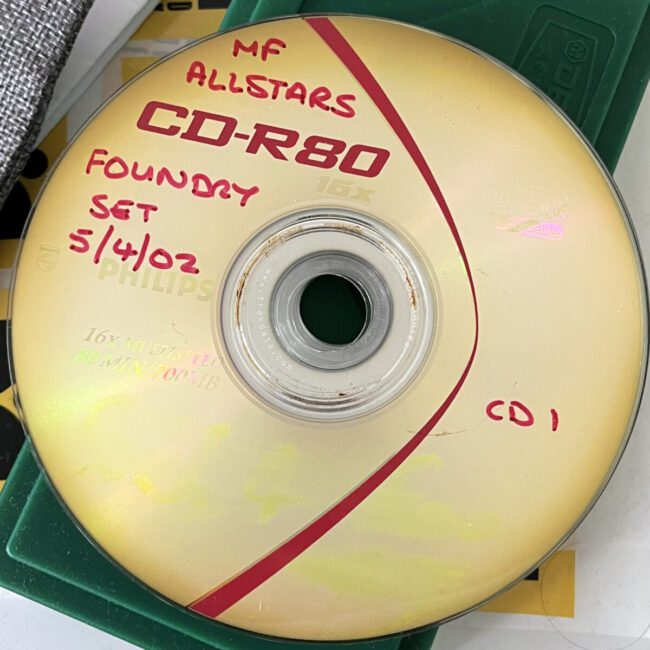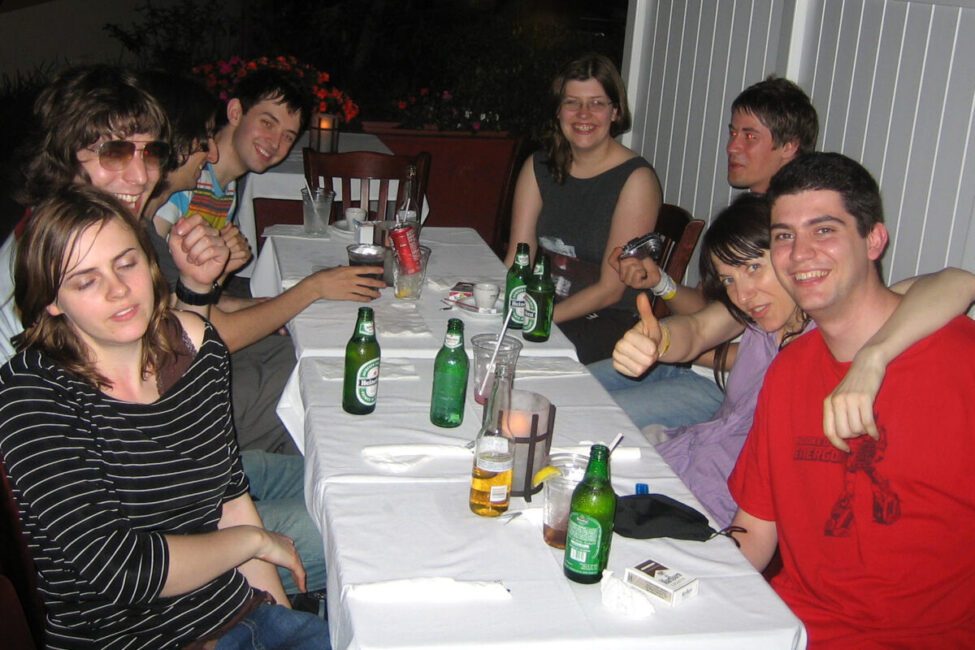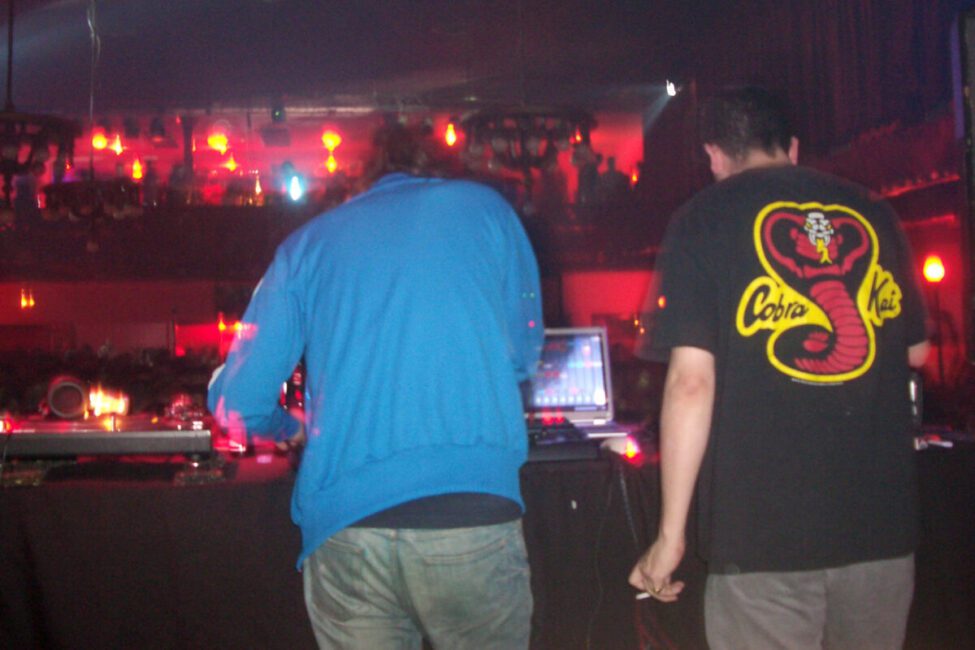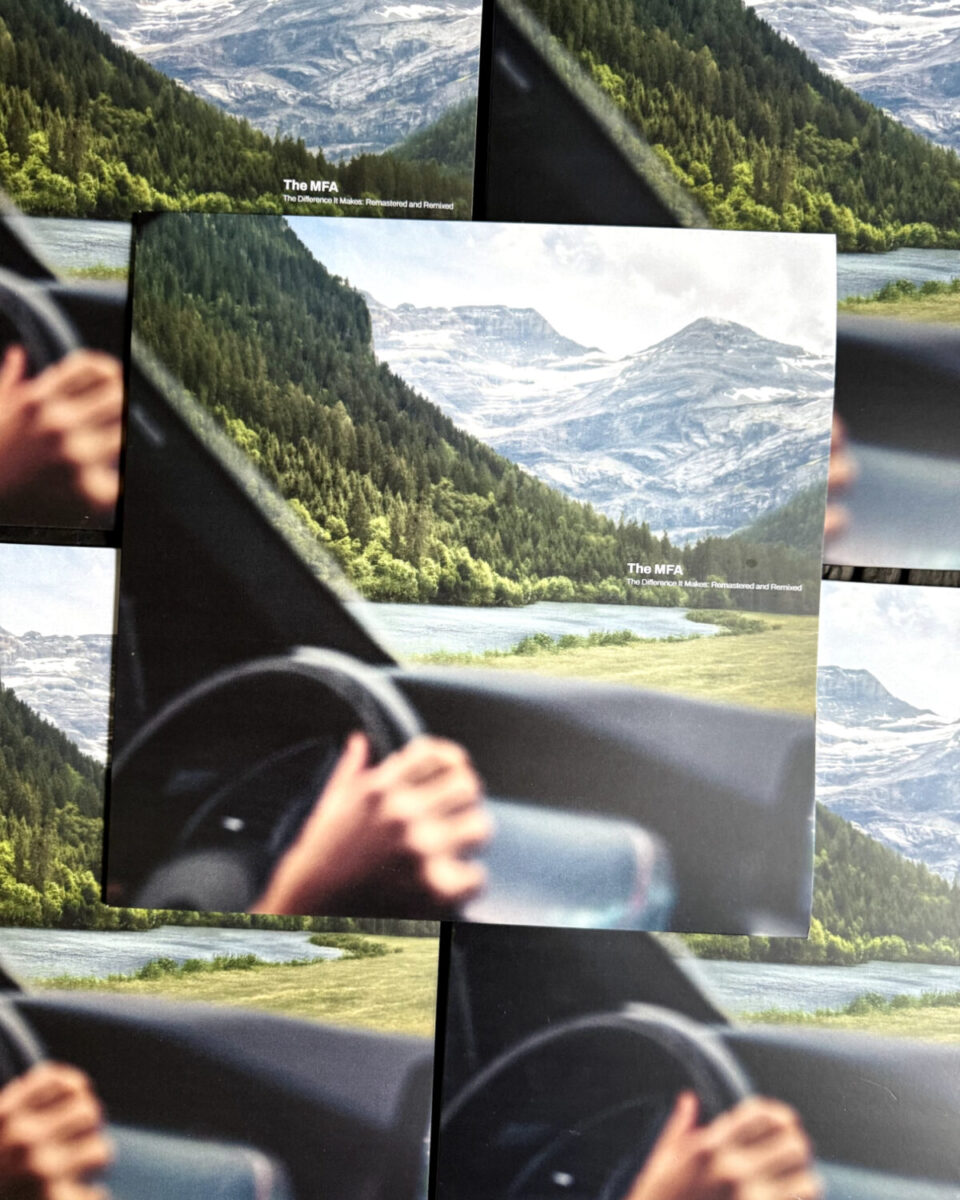Some tracks slip into the bloodstream of club culture, and never quite leave. The MFA’s ‘The Difference It Makes‘ is one of them. Originally released in 2002 on James Holden’s then-new label Border Community, this track quietly rewired expectations, an unassuming computer-built track that went on to connect with ravers, DJs, and outsiders alike. Twenty-three years later, it still carries that rare electricity – the kind of track that makes the hairs stand up on your arms.
What makes the story of The Difference It Makes so unlikely is where it was born. Not in a London squat or Berlin warehouse, but in Jean-Marie’s basement studio beneath a chalet in Les Diablerets, a quiet Swiss mountain village better known for ski slopes and folk music than forward-thinking electronica.
Using a battered PC, free software (Jeskola Buzz), and whatever gear they could get their hands on, The Mother Fucking Allstars (The MFA) – Ali and Rhys – pieced together a track out of happy accidents and stubborn determination. “We set out aiming for a peak-time banger,” they recall, “but the setting mellowed it into something more like an Ibiza chill-out track. Part of that was intentional, and part was that we really couldn’t figure out how to do proper drums.”
The charm of the record lay in precisely that tension: naive but inventive, euphoric yet restrained, underpinned by a vocal hook that seemed to crystallise a moment. James Holden, a university friend who had already become a name to watch on Radio 1, heard something special in it. Against all odds, the track landed as the third release on Border Community, the imprint that would go on to define a generation of artists.
Border Community wasn’t just a label, but a genuine circle of friends and producers – Nathan Fake, Perc, Petter, Avus, Luke Abbott, Dextro, Extrawelt, Fairmont, Wesley Matsell and others – who pushed each other to try new ideas. Through that connection The MFA found themselves sharing stages with Justice, Modeselektor, Vitalic, Felix Da Housecat, and Superpitcher, whose Kompakt remix of The Difference It Makes reframed the track in a typically hypnotic Cologne style. If the UK felt it as a leftfield house cut, Germany heard it as techno minimalism. Either way, the record travelled further than Ali and Rhys ever expected.
After a run of acclaimed releases including ‘Motherload‘ and ‘Throw It Back (We Will Destroy You)‘, The MFA went quiet after 2009. Life, distance, and “musical differences” pulled them apart. But music has a way of looping back around. A chance encounter with an old track at The Social in London rekindled the spark, leading to their 2023 return on Traum Schallplatten with a new album ‘Lights Out’.
Now comes the reissue of The Difference It Makes, remastered and remixed for 2025 by Joe Goddard of Hot Chip and Nathan Fake. It also marks the debut release of Deskbound Complex, The MFA’s new imprint. For Ali and Rhys, this isn’t nostalgia – it’s a reset, a reminder that ideas matter more than hardware, and that some tracks really do get better with age.
We caught up with The MFA to trace the unlikely journey of The Difference It Makes – from a Swiss basement to global cult status, and from near-breakup to fresh beginnings.
Saturday 15 November, The MFA host an in-store at Inverted Audio Record Store in Peckham (6-9 PM) to celebrate the reissue of The Difference It Makes. Event Info.
Interview by Tom Durston
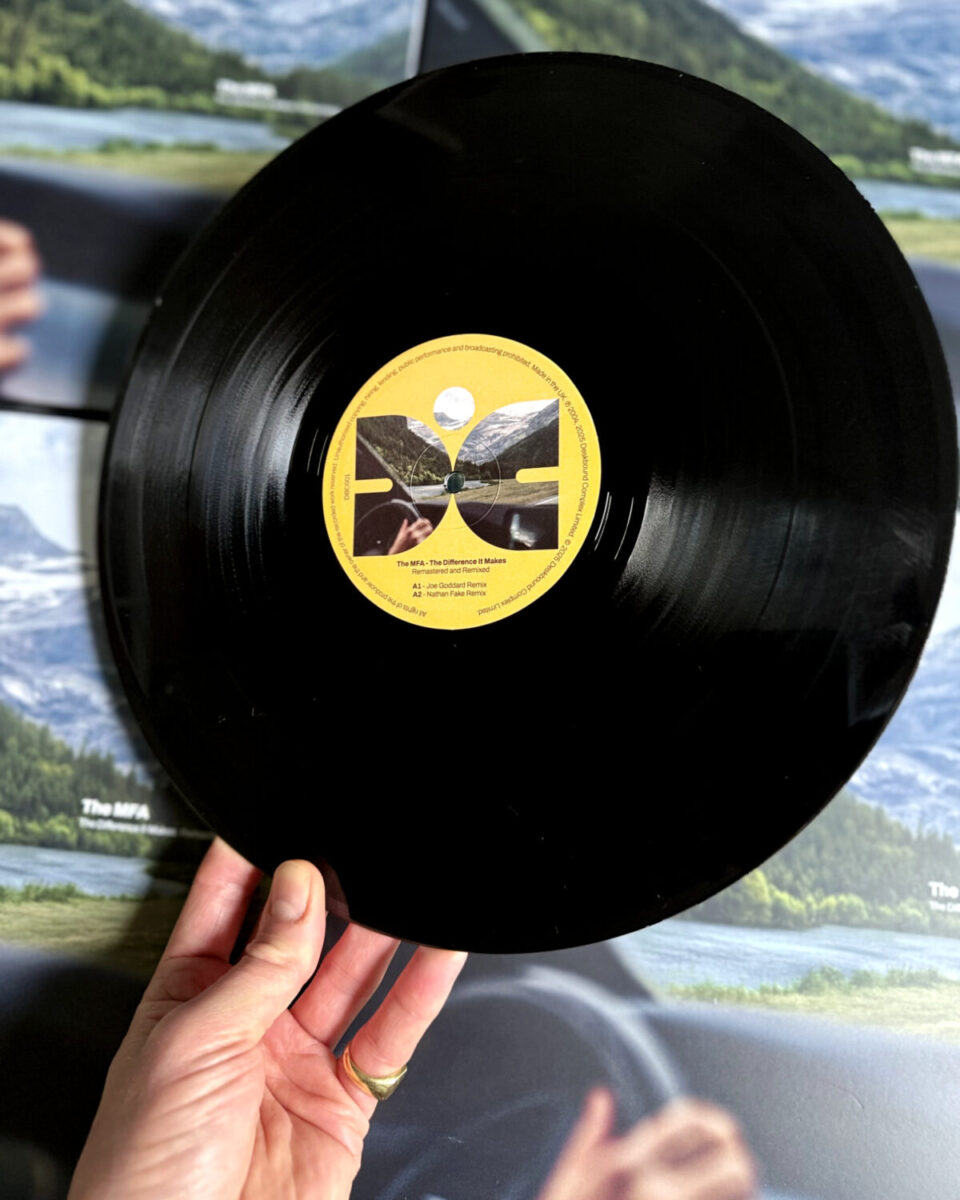
"What’s interesting is that as time has gone on, it seems to be becoming more popular, not less popular which is incredible to see when you consider that most things fade away with time."
The Difference It Makes was originally recorded in Jean-Marie’s Basement Studios in Les Diablerets, Switzerland. Can you describe the space and the vibe of working there – and did the Alpine surroundings influence the atmosphere of the track?
It was our friend Jean-Marie’s studio under his chalet where he lived in Les Diablerets. We used to joke about how his band was ‘pub rock’. He even had some old drum machines with polka presets. We shoved our tower PC in the corner facing the wall and wrote the whole thing on the computer.
Being up in the mountains definitely shifted our perspective. We would write all day, then slide across the snow for a beer in the evening, and that does influence you. It took us ages with the computer barely able to process the audio. The only pub in the village played old rock music and Swiss folk music. We set out aiming for a peak-time banger but the setting mellowed it into something more like an Ibiza chill out track. Part of that was intentional and part of that was that we really couldn’t figure out how to do ‘proper’ drums.
What kind of gear and instruments were central to the production of the original? Were there any happy accidents or improvisations that ended up defining its sound?
Fancy hardware was out of reach then for us, so discovering Jeskola Buzz on PC was the crucial moment. It was free, slightly chaotic, and it let us try to make what we were hearing in our heads although as we said that is easier said than done, you normally ended up with something else.
Our approach has always been that it is not about the kit, it is about the idea. Writing on a basic tower PC with free software made it accessible for us and gave us our own angle. The track itself was a chain of happy accidents. We were still learning, so every time we tried to make one sound, something else interesting popped out. Getting the vocal to sound like that was a real excitement point. We like hardware too, but the idea that you must use hardware to be “real” is not something we subscribe to.
When you first finished The Difference It Makes, did you have a sense it could become something special, or was it just another experiment at the time?
We both felt something unusual. We had not made any music up until that point that anyone had told us they particularly liked! But this felt different. Ali had to drop Rhys down the mountain for a train the night we finished the track.
In the excitement Ali almost crashed the car having thought a farm track was the main road at a junction. Ali ended up vomiting shortly after that and even at the time we were wondering if it was the near death experience of the excitement of finishing the track! The next day a friend listened and just laughed, half not getting it, half enjoying it. A very odd reaction, but a reaction all the least! So we were hopeful.
How did you first cross paths with James Holden, and what was the story behind signing the track to Border Community?
We knew James from university. He was already known as a music prodigy with a Pete Tong tune of the week on Radio 1 and embarking in life as a DJ. We had been sending him our tracks for a couple of years and it became a running joke about how bad they were. When we finally sent “The Difference It Makes,” we’re not sure if he or us were more surprised that he liked it! Border Community was forming and the timing was very lucky and perfect.
Border Community quickly became an influential label in the early 2000s. What was it like being part of that movement, and how did it shape you as artists?
It felt like friends more than a movement. Perc, Nathan Fake, Gwill Morris, Avus, Dextro, H-Bomb, Doo doo, Petter who is now Pedrodollar, and James of course. Hearing what everyone else was making pushed us to try new ideas. James and Gemma from Border Community really delivered on their vision of creating a community!
Playing live brought us into contact with Felix Da Housecat, Rex The Dog, Justice, Modeselektor, the late DJ Mehdi, Uffie, Superpitcher and Vitalic and dozens of others. Being around that level of creativity lifts your standards and helps keep everything fresh in your head.
The track later got picked up by Kompakt with a remix from Superpitcher. How did that connection come about, and what was your reaction to hearing his version?
That came through the label rather than us directly. At the time we did not know much about Kompakt or techno. We had been producing drum and bass and the first non drum and bass track we wrote was ‘The Difference It Makes’. On first listen, Superpitcher’s remix threw us. It felt like a looped sliver of our track, we didn’t understand. Over time we grew to love it. It reframes the original in a really elegant, hypnotic way and sounds huge.
Did you notice a difference between how the track was received in the UK and Germany, given it had homes on both Border Community and Kompakt?
Not especially, at least not then. We only realised how widely it had connected years later when streaming made the listening patterns visible. At the time we were mostly focused on making and playing music. What’s interesting is that as time has gone on, it seems to be becoming more popular, not less popular which is incredible to see when you consider that most things fade away with time.
Looking back at your early catalogue – from Motherload to Throw It Back (We Will Destroy You) – what stands out to you most about that era of creativity?
Fun and instinct. We tried not to overthink. “Zone Day EP” really was done in a day. “Overhang” is called that because one of us had a hangover. We wanted immediacy and colour at a time when going out clubbing often felt like each DJ would play two hours of one long boring track with “Papua New Guinea” at the end. Just to be clear Papua New Guinea is one of the best tracks of all time so that’s a great end but why the 2 hour build up! We love depth, but we were chasing that feeling when a track grabs you straight away.
You stopped releasing music after 2009 for over a decade. What led to that decision, and what have you been doing in the years since?
Life pulled us in different directions and we lost the intensity. During the period where we wrote most of our tracks we had been living together and spending every night writing music in the studio (one of our bedrooms in reality).
There was also a flare-up after a gig and we fell out for a while. Unfortunately we weren’t immune to the old cliche of ‘musical differences’! Years later, at a birthday in the basement of The Social, an old unreleased track came on and a friend ran over asking what it was because he loved it. That nudge, plus a night of playing records together, reminded us how much we enjoyed this. We started talking again and the door reopened.
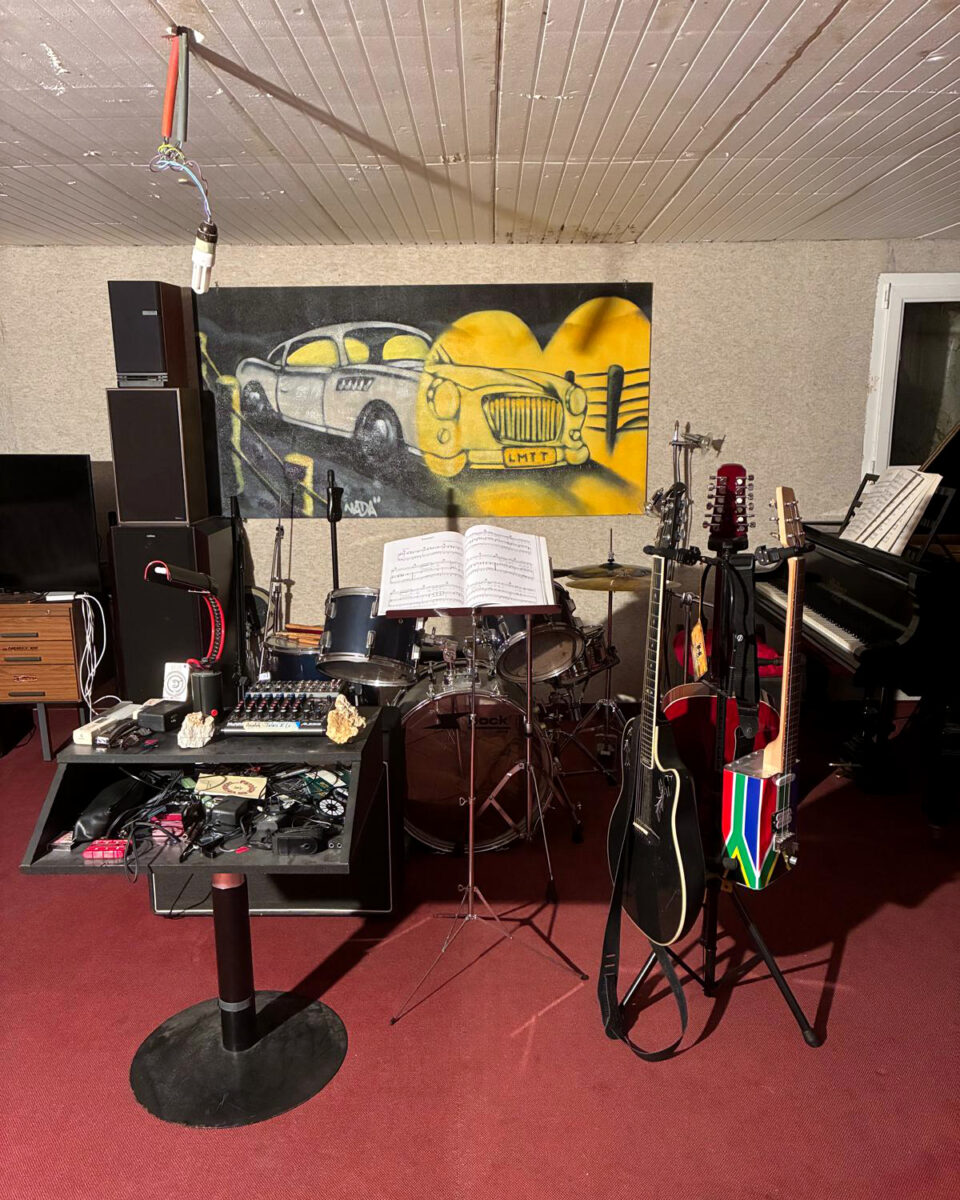
"We set out aiming for a peak-time banger but the setting mellowed it into something more like an Ibiza chill out track. Part of that was intentional and part of that was that we really couldn't figure out how to do ‘proper’ drums."
During that time, did you continue making music privately, or was it a complete break from production?
Rhys kept writing music and wrote some very different things – maybe it will see the light of day one day. Ali pretty much stopped writing music and focused on other things.
In 2023, you resurfaced with a new single and album on Traum Schallplatten. Was that material drawn from the archive, or entirely new productions?
Mostly new, with a few live favourites rethought. Writing in lockdown was tough because we rely on being in the same room and messing around until it clicks. For our album ‘Lights Out’, James Holden kindly lent us his studio at one point, which is equal parts wonderful and intimidating, but that coincided with Covid and Ali got it on day one so that nice period of time we had planned all went up in smoke.
Things turned around when Delone and Cumhur Jay invited us to Riverette’s label camp at Can Jay Recording Studios in Ibiza after we remixed his track Ezaro from his excellent album Reset All To Default. Four days there with great people and gear, and the album finally came together.
Fast-forward to today: what made now the right moment to reissue The Difference It Makes?
It is 23 years since we wrote it and the lore around the number 23 appeals to us, almost as much as it did to our heroes The KLF. More importantly, we are serious about launching our new label, Deskbound Complex, and this is a great way to get people to pay attention while we build something for the long term.
You’ve revisited the track yourselves with a brand new version. What was it like approaching your own classic 23 years later, and how did you want this rework to differ?
We played at the Traum Schallplatten 25 years anniversary party at the Artheater in Cologne and played it in a completely different way to how we ever had before. It was very different but we loved it. That became the starting point of the remix.
Before that, every studio attempt slipped toward recreating the original but not as well. Using the live arrangement freed us up. After that it was the usual trying different ideas whilst arguing about what sounded good (or not)!
Joe Goddard of Hot Chip contributes a remix to the reissue. How did his involvement come about, and what was your first reaction on hearing his rework?
We had noticed Joe playing it over the years. We once DM’d him to say thanks after he played it on Tim Sweeney’s Beats In Space show and he replied that it was one of his favourites. So we asked if he would remix it. He said yes straight away and a month later it landed. It is similar but different in just the right way, and the breakdown is euphoric. We cannot wait to hear it on a big system.
Nathan Fake has been a long-time friend. What’s the story behind his remix, and how does it reflect your shared history?
We met Nathan at Paddington Station around 2000 at a music message board meet-up, long before any of us had released much. Our tastes were mixed then, Rhys loved the Super Furry Animals, Ali loved Daft Punk and Nathan loved all kinds of weird stuff we had never heard of, but we all shared a love of old skool rave and Orbital.
Nathan’s remix feels like a 90s rave fever dream that suddenly snaps into reality halfway through. It is very Nathan and very special. We do not know anyone else who could have even tried what he has pulled off with this incredible remix.
Deskbound Complex is your new label, launching with this reissue. What’s your vision for the imprint, and should fans expect more new material from The MFA in the near future?
Yes, there will be more from The MFA probably, but the label is bigger than us, it is not a vanity project. Deskbound Complex is about finding exciting new sounds and doing a proper job helping those artists find both an audience and a scene to collaborate and innovate with.
We want to bring creative people we like and respect into the same orbit, because we benefited so much from that kind of scene before. It is about good music, good people, and keeping it fun.
‘The Difference It Makes: Remixed & Remastered ft Nathan Fake, Joe Goddard’ is out now via Deskbound Complex. Buy a vinyl copy from Inverted Audio Record Store. Saturday 15 November, The MFA host an in-store at Inverted Audio Record Store in Peckham (6-9 PM) to celebrate the reissue of The Difference It Makes. Event Info.
TRACKLIST
A1. The Difference It Makes (Joe Goddard Remix)
A2. The Difference It Makes (Nathan Fake Remix)
B1. The Difference It Makes (Original Mix)
B2. The Difference It Makes (The MFA #23 Remix)
